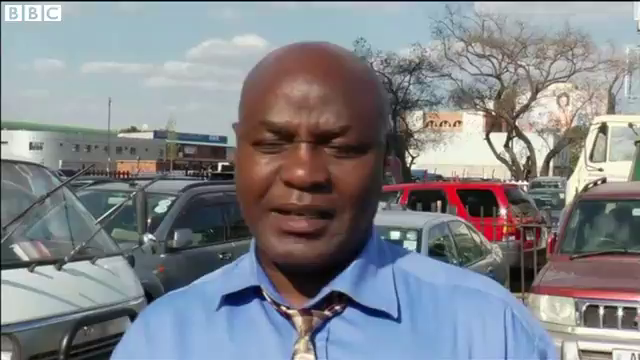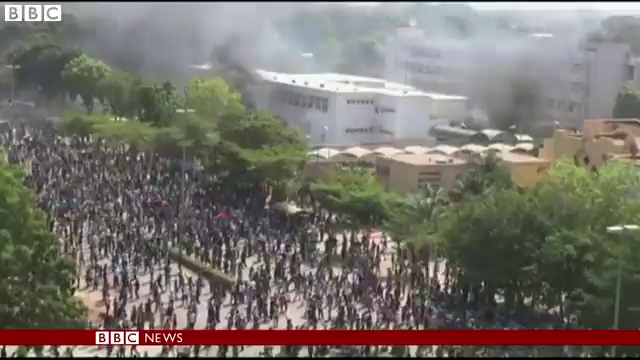redo Jump to...
print Print...
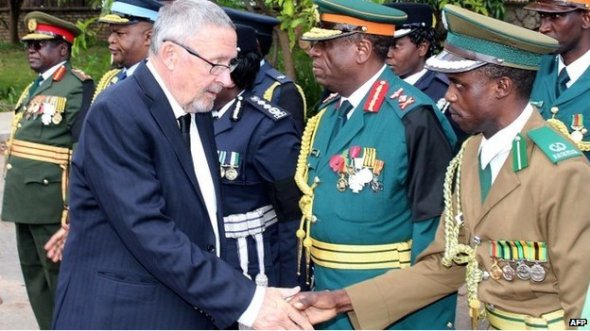
Zambia will have the unusual image of a white president following the death of the incumbent Michael Sata.
ZAMBIA – White Zambian named acting president
LUSAKA – Zambian President Michael Sata, once dubbed “Mr. King Cobra” for his sharp-tongued remarks, died in a London hospital (on Tuesday, Oct. 28) after a long illness, the Zambian government said Wednesday. Vice President Guy Scott, a white Zambian of Scottish descent, was appointed acting president of the southern African nation (on Oct. 29) until elections are held within 90 days.
Scott is the first white leader of any African nation since F.W. de Klerk, the last president of South Africa under apartheid ended there in 1994. Scott, a 70-year-old former agriculture minister, has said he has no presidential ambitions, and he cannot in any case become a fully empowered president because his parents were born outside Zambia, according to analysts. [The Zambian constitution’s “parentage clause” requires the president to be a “third generation” Zambian.]
“Dr. Scott will act as president of the republic of Zambia until the country goes for a presidential by-election,” said Defense Minister Edgar Lungu, who is also secretary general of the ruling Patriotic Front party. …
Lungu had served as acting president when Sata traveled to London for medical treatment earlier this month. Scott was previously agriculture minister and has also worked in Zambia’s finance ministry. …
Sata’s wife, Christine Kaseba-Sata, and his son, Mulenga Sata, were at the 77-year-old president’s side when he died, Msiska said. Mulenga Sata is the mayor of the Zambian capital, Lusaka.
“I urge all of you to remain calm, united and peaceful during this very difficult period,” Cabinet secretary Roland Msiska said in an appeal to Zambians. …
Kenya, South Africa and other countries sent condolences to Zambia after Sata died. British Foreign Secretary Philip Hammond said Sata “played a commanding role in the public life of his country over three decades.”
Rumors that Sata was deathly ill had gripped Zambia since the leader largely dropped out of public view months ago, and opposition groups had questioned whether Sata was fit to lead a country of 15 million people that has enjoyed robust economic growth but suffers widespread poverty.
On Sept. 19, Sata spoke at the opening of parliament in Lusaka, poking fun at speculation about his failing health, saying that he was still alive.
Following that appearance, Sata failed to give a scheduled address at the United Nations in New York and police said doctors treated him in a hotel room.
Earlier this year, Sata traveled to Israel amid speculation he was seeking medical treatment. On Oct. 20, Zambia said Sata had left for a “medical check-up abroad.” …
BURKINA FASO – President for 27 years, Blaise Compaore steps down amid widespread protests
Burkina Faso’s interim President Isaac Zida said on Monday that the army would quickly cede power to a transitional government headed by a consensual leader, in a bid to calm accusations that it had seized power in a military coup.
The country’s longtime president Blaise Compaore stepped down on Friday after two days of mass protests over his bid to extend his rule through a constitutional amendment.
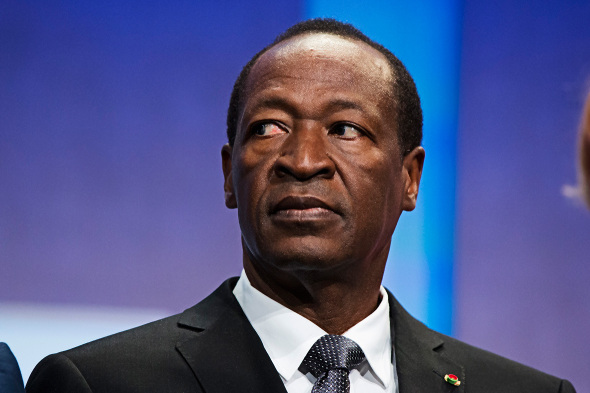
Burkina Faso’s longtime president Blaise Compaore
Compaore was only 36 when he seized power in a 1987 coup in which his former friend and one of Africa’s most loved leaders, Thomas Sankara, was ousted and assassinated.
The 63-year-old has remained in power since then, re-elected president four times since 1991 – to two seven-year and two five-year terms.
In 2005, constitutional limits were introduced and Compaore is coming to the end of his second five-year term.
The opposition fears the new rules would enable Compaore to seek re-election not just once, but three more times, paving the way for up to 15 more years in power.
The third largest party in parliament said at the weekend it would back the amendment, setting the ruling party on course to obtain the two-thirds majority it needs to make the change without resorting to a referendum as first promised. Protesters have erected barricades and burned tires in the capital since the proposal was announced on October 21.
On Saturday, the military appointed Lieutenant Colonel Zida as interim head of state in a move criticized by opposition politicians, the African Union and Western powers seeking a return to civilian rule.
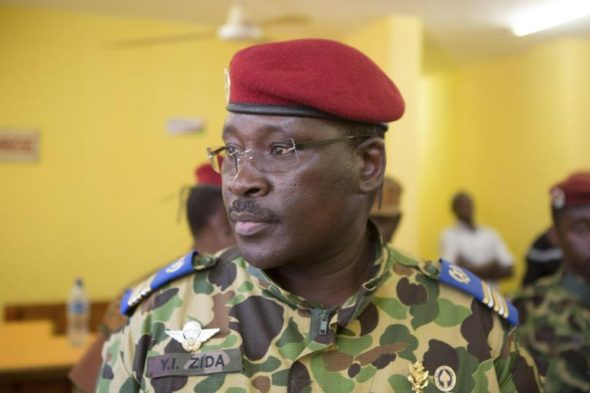
Lt. Col. Isaac Yacouba Zida was named the transitional leader of Burkina Faso.
“Our understanding is that the executive powers will be led by a transitional body but within a constitutional framework that we will watch over carefully,” Zida told a gathering of diplomats and journalists in the capital Ouagadougou, without giving a timeframe for the changeover.
“We are not here to usurp power and to sit in place and run the country but to help the country come out of this situation,” he added.
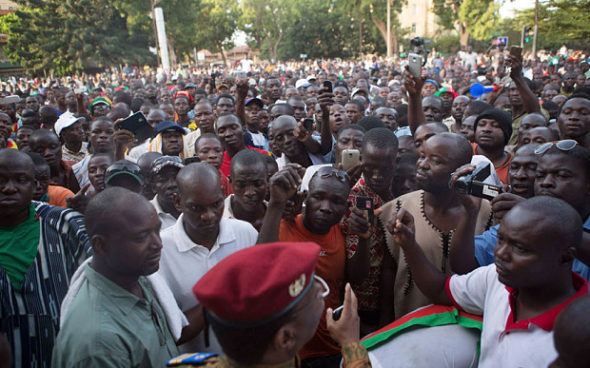
An army spokesman speaking to anti-government protesters on Thursday.
The announcement followed crisis meetings late on Sunday between Zida and opposition leaders after thousands gathered to denounce his appointment in the central Place de la Nation — the scene of violent protests last week in which the parliament was set alight.
Under the West African country’s constitution, the head of the National Assembly should take office if the president resigns, with a mandate to organize elections within 90 days. However, the head of the National Assembly has reportedly to have fled the country, along with other senior members of Compaore’s regime.
Compaore himself arrived in neighboring Ivory Coast on Saturday, the government there said in a statement.
SIERRA LEONE – Ebola outbreak ‘catastrophic’ Doctors Without Borders says
Ebola has wiped out whole villages in Sierra Leone and may have caused many more deaths than the nearly 5,000 official global toll, a senior coordinator of the medical aid group MSF (Médecins Sans Frontières, or Doctors Without Borders) said Friday.
Rony Zachariah of Doctors Without Borders, known by its French initials MSF, said after visiting Sierra Leone that the Ebola figures were “under-reported,” in an interview with AFP on the sidelines of a medical conference in Barcelona.
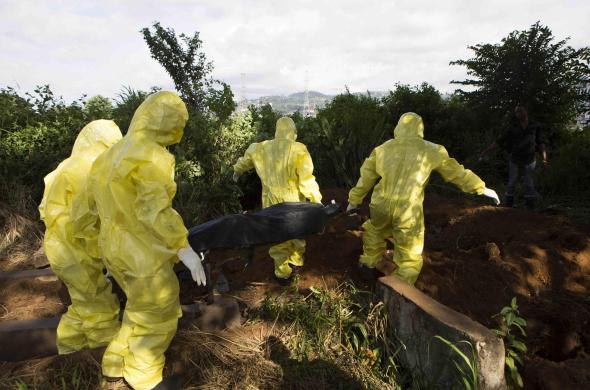
Burial team prepares body of Ebola virus victim in Freetown, Sierra Leone.
“The situation is catastrophic. There are several villages and communities that have been basically wiped out. In one of the villages I went to, there were 40 inhabitants and 39 died,” he said.
The World Health Organization (WHO) published revised figures on Friday showing 4,951 people have died of Ebola and there was a total of 13,567 reported cases.
“The WHO says there is a correction factor of 2.5, so maybe it is 2.5 times higher and maybe that is not far from the truth. It could be 10,000, 15,000 or 20,000,” said Zachariah.
He stressed that “whole communities have disappeared but many of them are not in the statistics. The situation on the ground is actually much worse.”
He added that in some places the local healthcare systems were overwhelmed.
“You have one nurse for 10,000 people and then you lose 10, 11, 12 nurses. How is the health system going to work?”
After isolated cases in Europe, “we might get a vaccine and a treatment… but even now we need to go much faster because the clock is ticking,” he said. “We want action now.”
(The news briefs above are from wire reports and staff reports posted at YahooNews on Oct. 29, Reuters on Nov. 3 & Daily Telegraph on Oct. 30 and YahooNews on Oct. 31.)
Questions
1. For each of the 3 countries, give the following information:
a) capital
b) location/the countries that share its borders:
c) the religious breakdown of the population:
d) the type of government:
e) the chief of state (and head of government if different) [If monarch or dictator, since what date has he/she ruled? – include name of heir apparent for monarch]:
f) the population:
NOTE: Before answering the questions below, read the info under “Background” and watch the videos under “Resources.”
2. For ZAMBIA:
a) list the who, what, where and when of the news item
b) Why won’t Mr. Scott run for the office of President?
c) What do you think about the Zambian constitution’s “parentage clause,” which requires the president to be a “third generation” Zambian?
3. For BURKINA FASO:
a) list the who, what, where and when of the news item
b) Under Burkina Faso’s constitution, the head of the National Assembly should take office if the president resigns. Why hasn’t that happened in this case?
4. For SIERRA LEONE:
a) list the who, what, where and when of the news item
b) What is the biggest problem faced by MSF and others caring for Ebola victims in Sierra Leone?
Background
ZAMBIA – About President Sata:
- Sata had a mixed relationship with Chinese investors in Zambian mines and other infrastructure, criticizing them as exploitative but toning down his rhetoric after taking office.
- Some critics say Sata became increasingly intolerant as president. An opposition leader, Frank Bwalya, was acquitted this year of defamation charges after he compared Sata to a local potato whose name is slang for someone who doesn’t listen.
- As an opposition leader, Sata lost three presidential votes, before winning to become Zambia’s fifth president in 2011. He also served in previous governments, and was a member of every major party.
- Sata was born in Mpika in what was then northern Rhodesia, and worked as a police officer and trade unionist under colonial rule. He also trained as a pilot in Russia.
- After independence in 1964, he joined Kenneth Kaunda’s United National Independent Party, becoming governor of Lusaka, a city as well as a province, in 1985.
- He resigned from Kaunda’s party in 1991 and joined the newly formed Movement for Multiparty Democracy, later serving as a party lawmaker for 10 years and as minister for local government, labor and social security, and health.
- In 2001, he left to form his Patriotic Front party. In 2008, he suffered a stroke and went to South Africa for treatment. The same year, President Levy Mwanawasa died following a stroke and a special election held later saw Sata narrowly lose to Rupiah Banda, who had been Mwanawasa’s vice president.
- Sata’s wife is a medical doctor and the couple had eight children. When Sata introduced Kaseba-Sata at the opening of parliament last month, he credited her with tough love. “She has made me stay up to now,” he said. “I haven’t died yet.” (from the YahooNews article above)
About acting president Guy Scott:
- Guy Scott a white 70-year-old ex-farmer and economist, has become Zambia’s acting president, ending speculation that his heritage would stop him being acting leader in the southern African state, where white people make up less than 40,000 of Zambia’s 14 million-strong population.
- Often disparagingly referred to as the “ceremonial vice-president”
- He was born in 1944 in what was then Northern Rhodesia after father emigrated from Glasgow to work as a doctor on the railways
- A Cambridge-trained economist, he entered politics in 1990 joining the MMD which won the first multiparty elections the next year
- As agricultural minister he oversaw the recovery from a devastating drought in 1992/93
- He joined Michael Sata’s Patriotic Front (PF) in 2001
- Appointed vice-president in September 2011 after the PF’s election victory – believed to have been appointed by President Sata in appreciation for his help: he was a major funder of the Patriotic Front (PF) party, helping it to gain power for the first time in 2011 after Mr. Sata spearheaded the modernization of the party. (NOTE: Sate never appointed Vice President Scott as acting president when he was absent from the country)
- As his parents were not born in Zambia a constitutional clause on parentage may nullify any attempt to run for president (from bbcnews.com)
SIERRA LEONE
- Ebola cases are continuing to rise “frighteningly quickly” in areas of Sierra Leone, an international campaign group has said.
- The Africa Governance Initiative (AGI) found that in rural parts of the country the virus is spreading nine times faster than two months ago.
- In Liberia, however, the rate of new cases appears to have slowed.
- AGI’s findings come after World Health Organization officials told the BBC the number of new cases is leveling off.
- Though Sierra Leone’s rural areas have been worst hit, the group says the spread of Ebola is also increasing in the capital Freetown – which is recording six times more cases per day compared to two months ago.
- The virus has only started to slow in one region of Sierra Leone, Bombali in the country’s north.
- AGI – an organisation set up by former UK Prime Minister Tony Blair that operates in the affected countries – says it is not sure why cases are slowing in Liberia.
- But the group says burial management has “improved significantly” in both Liberia and Sierra Leone. Half of all Ebola infections are thought to come from the bodies of victims.
- AGI Chief Executive Nick Thompson said: “The picture is certainly changing but that’s all we can say for sure at the moment.
- “The pace of the spread in rural Sierra Leone shows we still have no time to lose.” (from bbcnews.com)
Resources
ZAMBIA: For an article about Guy Scott, go to: bbc.com/news/world-africa-29816559
Watch a news report below:
BURKINA FASO: For background on Burkina Faso, go to bbcnews.com
Watch two news reports below:
SIERRA LEONE: Visit the Doctors Without Borders (MSF) website for Ebola in Africa: msf.org/article/interactive-explore-ebola-care-centre
Watch a news report below:
Daily “Answers” emails are provided for Daily News Articles, Tuesday’s World Events and Friday’s News Quiz.

